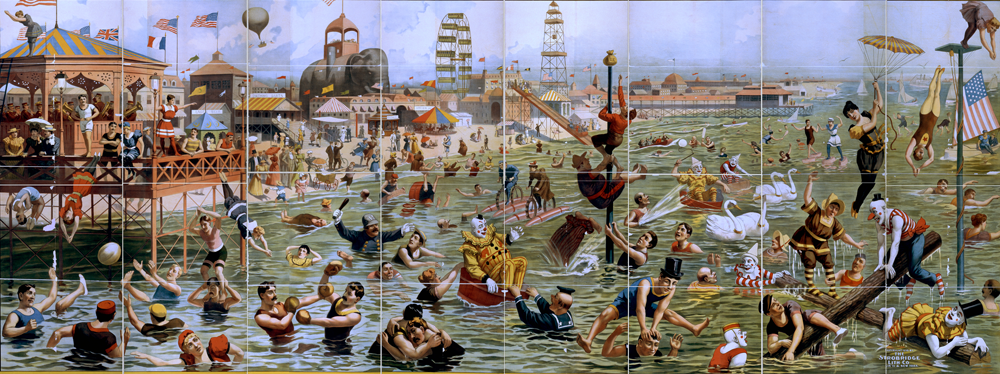
Coney Island lithograph, 1898. Library of Congress.
• Scandalous language and innuendo in Shakespeare’s Antony and Cleopatra. (Strong Language)
• A Roman tavern discovered in France sheds new light on the influence of Roman culture upon other peoples: “‘Based upon the evidence presented here, it appears that the courtyard complex…functioned as a space for feeding large numbers of people, well beyond the needs of a single domestic unit or nuclear family,’ the researchers wrote in the study.’ This is unusual, as large, ‘public’ communal spaces for preparing large amounts of food and eating together are essentially nonexistent in Iron Age Mediterranean France.” (LiveScience)
• Neanderthal experts kindly wish we would all stop using “neanderthal” as an insult. (Atlas Obscura)
• Alex Mar reckons with blood ties to a famous Spanish conquistador: “Self-mythologizing takes place when we assimilate the stories of our ancestors into our own—it’s automatic. We tell ourselves that their triumphs have somehow entered our bloodstream. We’re not descendants, we think; we’re heirs—heirs to intangible qualities (ambition, brilliance, endurance) through the fact of a thoroughly diluted blood tie. We allow ourselves to revise and cull from a shared history we lay claim to, every dead relation a past life lived vicariously.” (Oxford American)
• A traveling exhibit of William Shakespeare and Jane Austen memorabilia will bring a shirt famously worn by Colin Firth in the 1995 BBC adaptation of Pride and Prejudice to America. (New York Times)
• J. Hoberman considers the legacy of Coney Island: “Dreamland burned to the ground in 1911. In 1921, after the Brooklyn Rapid Transit company extended its street cars and subway lines to Coney Island, the boardwalk opened, along with numerous hot-dog stands and tawdry amusements. ‘Huge masses of people were arriving,’ Joseph Heller wrote in his memoir of growing up in Coney, ‘first tens of thousands on summer weekends, then hundreds of thousands, finally a million and more…’ The elegant fairyland of Dreamland and Winsor McCay became something more vulgar, albeit a source of folk expressionism and found surrealism for American painters.” (New York Review of Books)